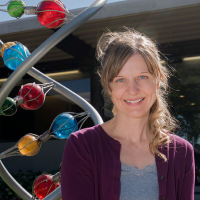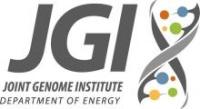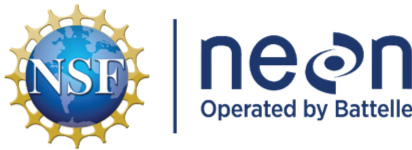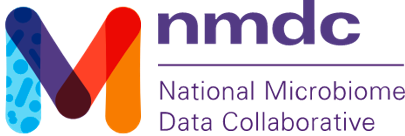Molecular Observation Network (MONet)
Soils are fundamental to ecosystem resiliency, regulating energy flows and system stability in response to natural and human-induced changes. Acting as a major reservoir of chemical energy, soils influence the transformation, retention, and release of key molecular components. Understanding these processes at the molecular level is essential for improving predictions of ecosystem responses and developing accurate models for resource management and conservation.
The complexity of soil ecological and biogeochemical processes, combined with the lack of standardized molecular and microscale soil data at scale across the continental United States, has led to significant uncertainties in Earth system models. Addressing these gaps is critical for advancing basic science and improving our ability to predict and manage ecosystem dynamics.
What is MONet?
The Molecular Observation Network (MONet) is an open science network developed by the Environmental Molecular Sciences Laboratory (EMSL), which is housed on the Pacific Northwest National Laboratory campus. MONet’s mission is to develop a continental-scale database of standardized molecular and microstructural data to advance the understanding and prediction of microbially and root-driven inputs in soil ecosystems and terrestrial aerosol processes. The information provided by MONet is essential for advancing the accuracy of multiscale Earth system models, growing American scientific leadership, and enabling the next generation of soil and aerosol research both at EMSL and within the broader user community.
With this mission in mind, EMSL is
- building an open science community of collaborators and partners at universities and national laboratories, in agriculture and industry, and with community organizations to acquire samples from ecosystems across the United States
- developing a national, high volume/high quality FAIR (findable, accessible, interoperable, and reusable) database that will provide open access to rich and unique data for scientists, modelers, and experimenters to advance basic science
- integrating MONet biogeochemical and microbial process data streams into scaling relations to parameterize key variables for multiscale and larger-scale Earth system models.
To make this possible, MONet is standardizing molecular and microscale sample collection protocols and innovating high-throughput, automated analysis and processing workflows.
Get involved with MONet
There are several ways to get involved with MONet, including submitting a proposal to a soil sampling call, participating in an upcoming MONet Community Science Meeting, or joining the MONet team at a symposium or event. Learn how to get involved by visiting the participate tab.
To create data for the database, EMSL is collecting thousands of soil samples from across the continental United States.
Please consider submitting to a quarterly soil submission call as available. We invite national laboratory researchers, academic researchers, citizen scientists, undergraduate and graduate students from universities to participate.
There is no cost for participation other than submitting samples. EMSL is covering the cost of the analyses, and you will receive more than 20 different advanced data types to use in your research.
EMSL is collaborating with a broad range of partners managing an expanding network of natural, urban, and managed watershed, coastal, continental, and atmospheric sites, both experimental and observational.
MONet sampling tracker information is also available in Excel.
2025 MONet Sampling Call Schedule
Spring 2025 Sampling:
- Proposal Submission: January 2, 2025 to January 30, 2025
- Decision Notice: Late February 2025
- Sampling Period: Mid-March 2025 to May 2025
Summer 2025 Sampling:
- Proposal Submission: March 18 to April 17, 2025
(closed early due to reaching maximum number of submissions) - Decision Notice: Mid-May 2025
- Sampling Period: June 2025 to August 2025
Fall 2025 Sampling:
- Proposal Submission: July 10, 2025 to July 24, 2025
- Decision Notice: Mid-August 2025
- Sampling Period: September 2025 to November 2025
Winter 2025 Sampling:
- Proposal Submission: Sept. 16, 2025 to Oct. 16, 2025
- Decision Notice: Mid-November 2025
- Sampling Period: December 2025 to February 2026
Prepare your sampling submission proposal by reviewing examples of MONet access agreements:
- USFS Access Agreement Example
- MO-Prairie Foundation Access Agreement Example
- Agricenter Access Agreement Example
Participate in the MONet Contributor’s Consortium
The MONet Data Consortium is a citable authorship group that contains a collective of authors who have contributed soil cores for analysis and have opted into participation. Consortium participants will be listed as collaborators on papers where the MONet Data Consortium is cited as an author.
The Molecular Observation Network (MONet) is generating gold-standard, standardized, AI-ready data at regional and continental scales to enhance American innovation and scientific leadership in Earth systems models, advancing our ability to recover critical minerals and establish a predictive understanding of environmental impacts on energy system reliability and security. Big data is critical to this task, and MONet is designed from the ground up to deliver it. A data visualization tool is available to help researchers interact with the data collected during the MONet pilot 1000 Soils Project. We are actively working to improve visualizations and value all feedback.
Data Types and Training
Soil samples submitted to the MONet user program will be analyzed using an extensive suite of advanced techniques to produce different data types, including the following:
- high-resolution molecular composition of soil organic matter
- metagenomic sequencing
- 3-D microstructure
- dissolved solutes
- respiration, microbial biomass, and potential enzyme activity.
Data Collection
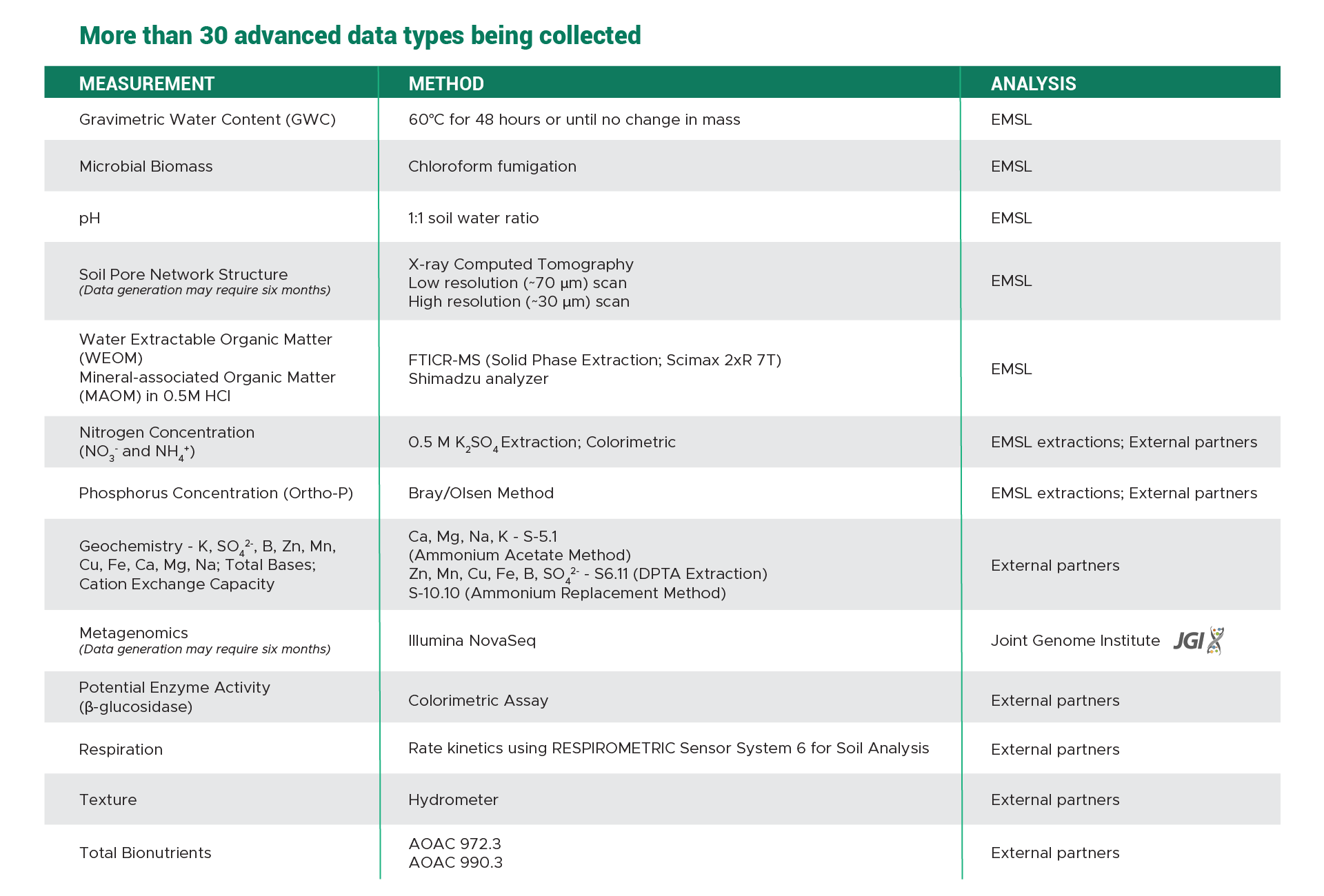
Data Availability
Consistent with open science principles, data are published on EMSL Science Central™, where they are publicly available without embargo according to the EMSL Data Policy.
MONet data are being generated, quality-checked, and uploaded to the Science Central™ portal by proposal call and data type, with the inclusion of ion cyclotron resonance (ICR) datasets as well as X-ray computed tomography and metagenomes (“other datasets” in the table in the next section). The first available data for fiscal year (FY) 2024 projects will be univariate biogeochemistry data available in the spring and summer of 2025. Review an Excel spreadsheet of the MONet data delivery schedule.
For metagenome data generated at the Joint Genome Institute (JGI), filtered reads, assemblies, annotations, and metagenome-assembled genomes (MAGs) will be provided for download on the JGI Data Portal. Metagenome data will also be made available through the Integrated Microbial Genomes and Metagenomes platform for comparative analysis.
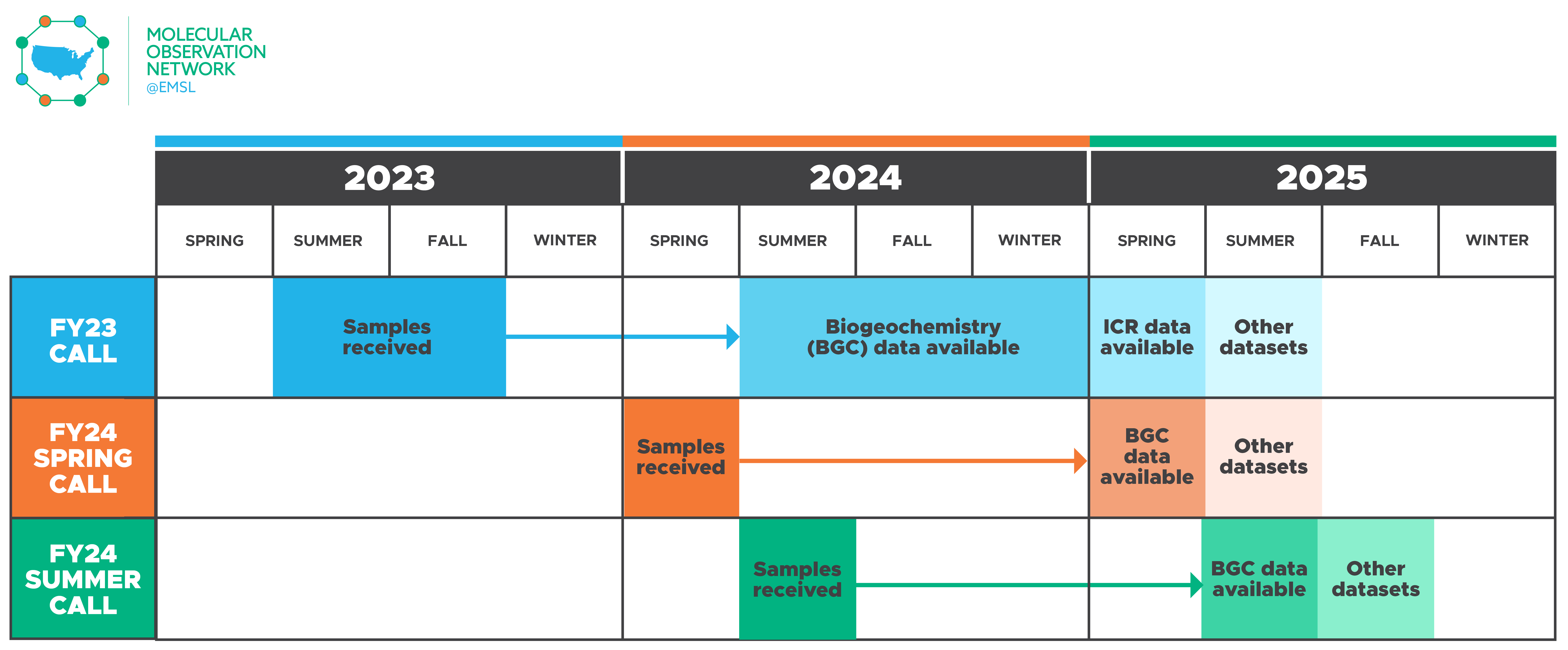
How to Acknowledge EMSL and JGI for MONet Data
“Soil data were provided by the Molecular Observation Network (MONet) at the Environmental Molecular Sciences Laboratory (https://ror.org/04rc0xn13), a DOE Office of Science user facility sponsored by the Biological and Environmental Research program under Contract No. DE-AC05-76RL01830. The work (proposal: 10.46936/10.25585/60008970) conducted by the U.S. Department of Energy, Joint Genome Institute (https://ror.org/04xm1d337), a DOE Office of Science user facility, is supported by the Office of Science of the U.S. Department of Energy operated under Contract No. DE-AC02-05CH11231.
The Molecular Observation Network (MONet) database is an open, FAIR, and publicly available compilation of the molecular and microstructural properties of soil. Data in the MONet open science database can be found at https://sc-data.emsl.pnnl.gov/.”
The MONet Team
John Bargar, EMSL |
Emily Graham, EMSL |
Odeta Qafoku, EMSL | ||
Yuri Corilo, EMSL |
Sara Leichty, EMSL |
Tanja Woyke, JGI | ||
Christa Pennacchio, JGI |
Strategic Partners
The Joint Genome Institute (JGI) will perform and prepare sequencing, metagenome analyses, assembly files, annotation, and bins of MONet samples. Data will be available for download from the EMSL MONet database and through JGI’s portals.
The National Science Foundation's National Ecological Observatory Network will provide a national network of field and observational sites to facilitate sampling and continuous sensing opportunities.
The National Microbiome Data Collaborative will support accessibility of MONet microbiome metadata.
Publications
Ghimire, S., Y. Zhang, J. Huang, E.L.W. Majumder, A.E. Hartemink, E.B. Graham, O. Qafoku, J. Andrews, and Z.B. Freedman. 2025. "Using mid-infrared spectroscopy to estimate soil microbial properties at the continental scale." Applied Soil Ecology 211 (106110). https://doi.org/10.1016/j.apsoil.2025.106110.
Cheng, S., M. Mudunuru, M.M. Bowman, Q. Zhao, J. Toyoda, W. Kew, Y. Corilo, O. Qafoku, J.R. Bargar, S. Karra, and E.B. Graham. 2025. "Scaling High-Resolution Soil Organic Matter Composition to Improve Predictions of Potential Soil Respiration Across the Continental United States." Geophysical Research Letters 52 (4). https://doi.org/10.1029/2024GL113091.
Bowman, M. M., A. E. Heath, T. Varga, A. K. Battu, R. K. Chu, J. Toyoda, T. E. Cheeke, S. S. Porter, K. B. Moffett, B. LeTendre, O. Qafoku, J. R. Bargar, D. M. Mans, N. J. Hess, and E. B. Graham. 2023. "One thousand soils for molecular understanding of belowground carbon cycling." Frontiers in Soil Science (3). https://doi.org/10.3389/fsoil.2023.1120425.
Videos
2023 Molecular Observation Network Community Science Meeting Training Videos
- Introduction to MONet Data Types
- Correlating Soil Respiration with Organic Matter (OM) Molecular Structure across Continental United States
- Metabolic Approaches to Studying Soils
- Intro to Natural Organic Matter Characterization
- Intro to X-ray Computed Tomography (XCT)
- XCT Raw Data Processing & Analysis for Comprehensive Insights
- OM Molecular Structure Analysis with FTICR Mass Spectrometry
- Imaging Soil Structure to Measure Soil Functions and Health
EMSL LEARN Webinar Series: MONet Proposal Submission: Tips for Success
- Learn details for MONet's quarterly soil sample submissions calls.
EMSL LEARN Tutorials: Molecular Observation Network Series
- Explore how to submit a proposal to an open call and how to collect a soil sample.







